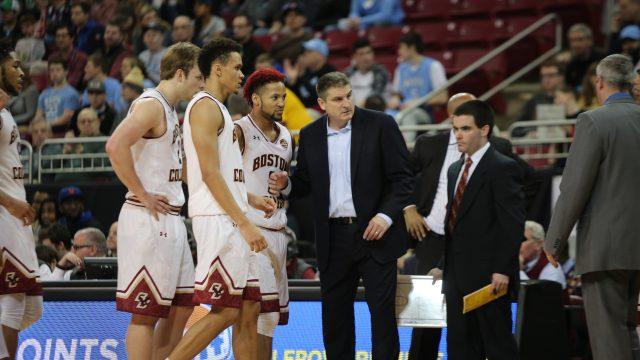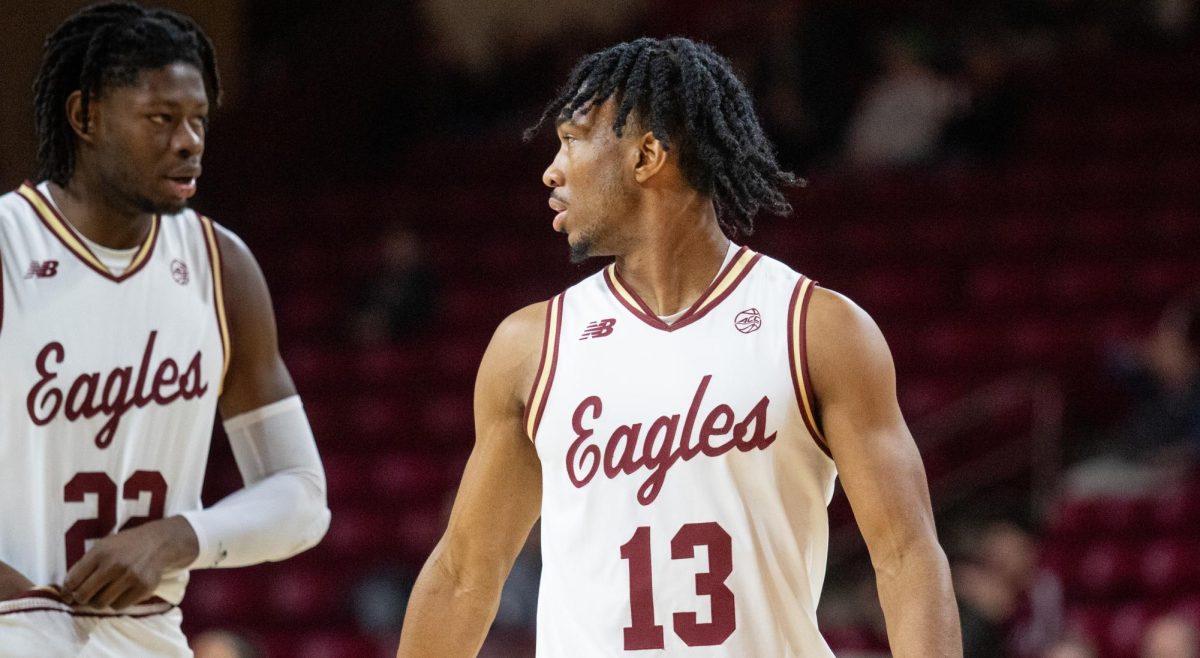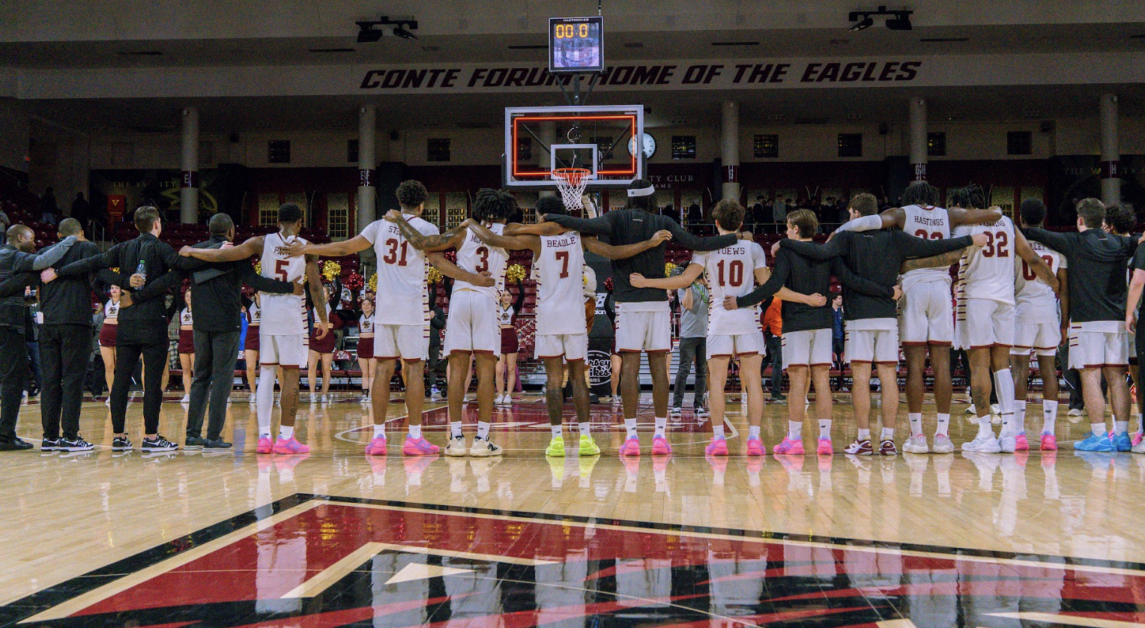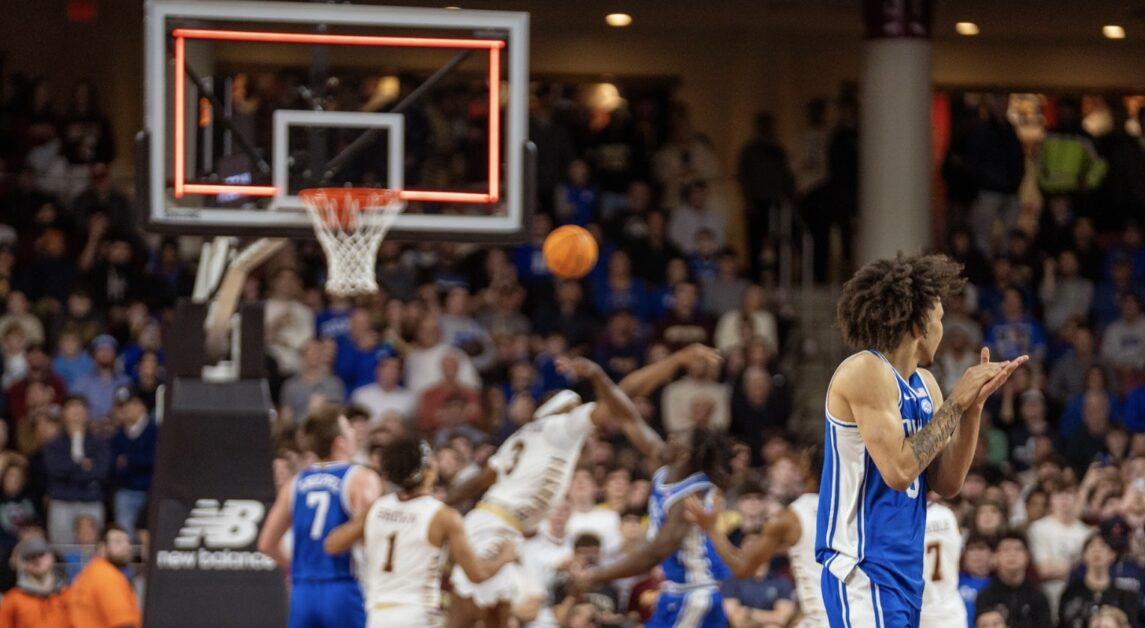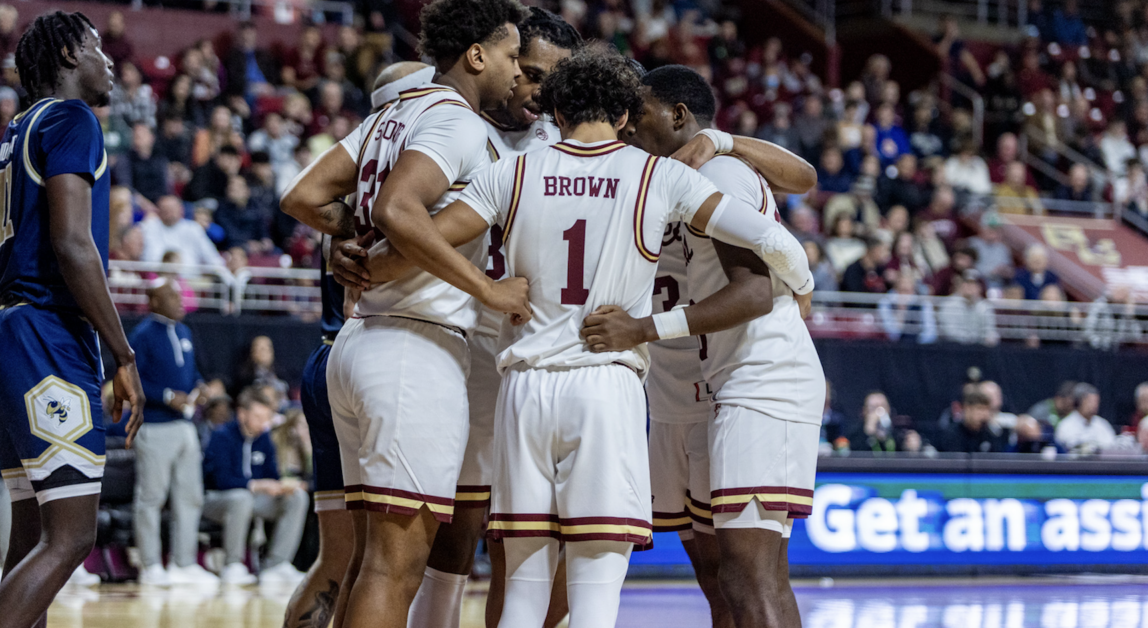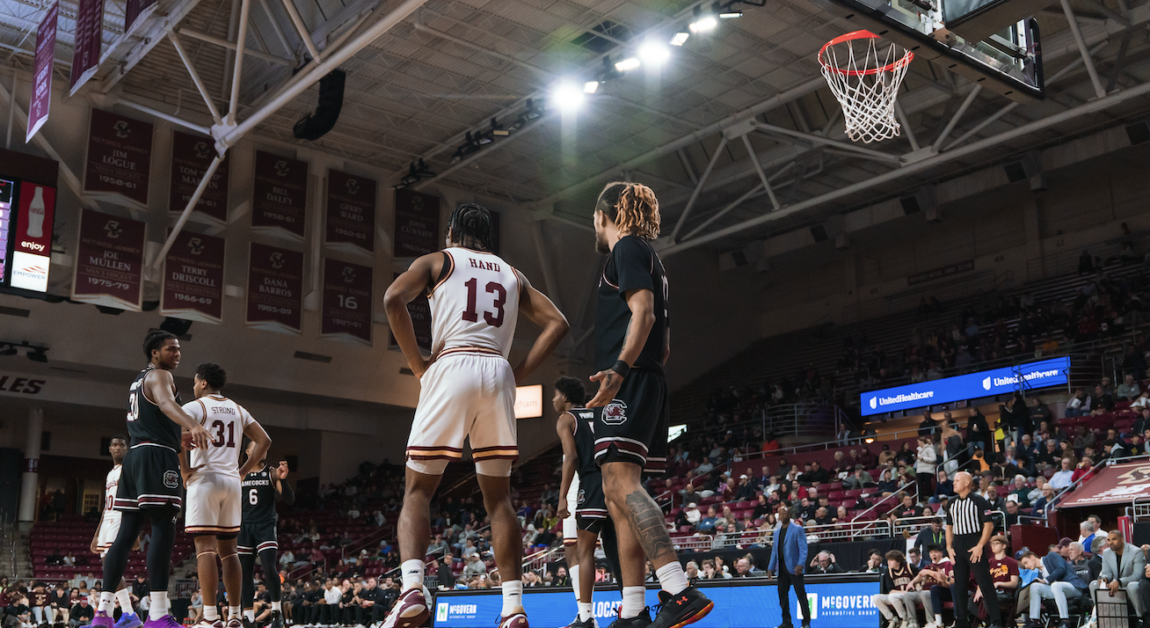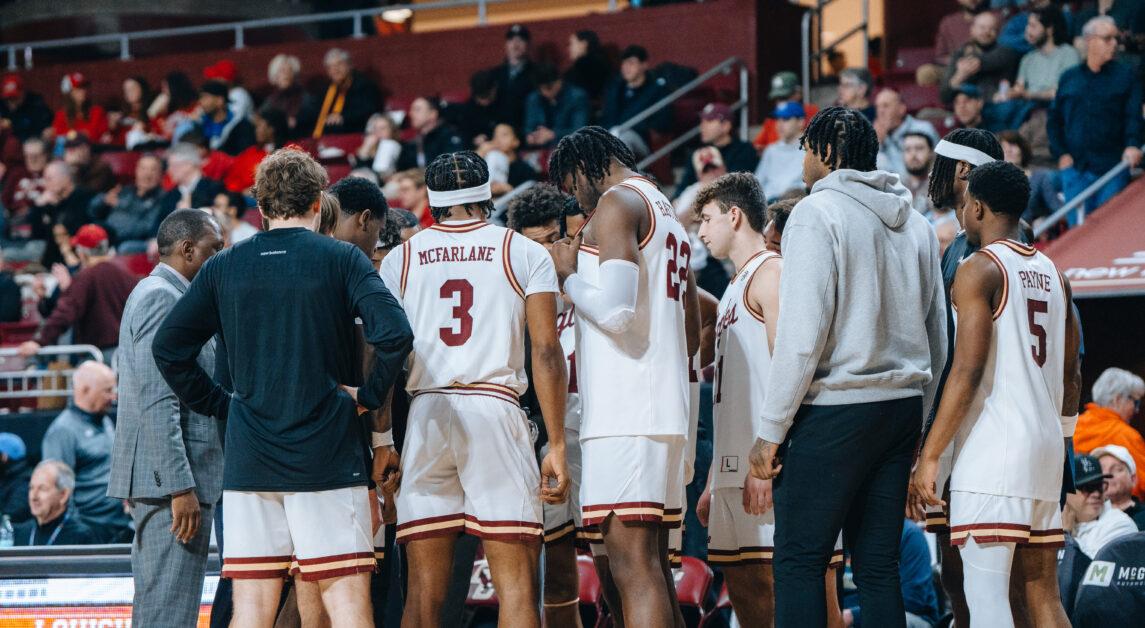After finishing the first half of Senior Day’s game on their feet, Boston College fans remained standing during halftime, as the school honored John Bagley and Dana Barros. The two BC legends emerged from the tunnel, en route to seeing their jersey retirements, with highlights from the glory days flashing on the big screen overhead. Footage of the 1980s Big East—one of the most competitive eras for a conference in college basketball history—momentarily whisked fans to another time, freeing them from the current struggles of the program. Barros’ video particularly wowed those in attendance. The sweet-shooting guard—who shot 43.2 percent from beyond the arc and made more than three triples per game as an Eagle— effortlessly drained shots from all over the court in the clips.
Keeping this in mind, you couldn’t blame the fans for assuming the second half was just a continuation of Barros’ highlights, as the ball repeatedly dropped through the net on one side of the court, with shots coming from every possible angle. Unfortunately, the team in maroon and gold was on the receiving end of those baskets, looking every bit as helpless as the defenders in the halftime montage.
Behind a second half explosion, in which they shot a whopping 75 percent from the field, Virginia Tech spoiled BC’s Senior Day, sending the reeling Eagles to their twelfth straight defeat on Saturday afternoon, 91-75. The loss was the fifth time in conference play that BC (9-20, 2-14 Atlantic Coast) has allowed an opponent to score at least 90 points. A day that started with so much optimism—BC honored senior Garland Owens and graduate transfers Mo Jeffers and Connar Tava before the game, with all three players entering the starting lineup—ended with a late collapse that was all too familiar to head coach Jim Christian.
“We’re not understanding yet the price you have to pay to win in this league,” he said after the game. “So the price is not a 30 minute effort. The price is 40 minutes, every possession.”
Similar to their last two home games—losses to Pittsburgh and Notre Dame—the Eagles started off with good effort and execution. Despite trailing 14-2 after just three and a half minutes—eerily reminiscent of their game at Virginia Tech (20-8, 9-7), where they fell behind 36-18 in the first half—BC refused to wave the white flag. Backed by eight points by Jordan Chatman and three forced turnovers, they engineered a quick 11-0 run in the next three minutes to close the deficit to one point. From that point until the end of the half, neither team led by more than five.
After allowing the Hokies to drain their first three triples, all assisted by point guard Justin Robinson, who easily penetrated along the sideline before rifling passes to the weak side corner, the Eagles tightened their perimeter defense. Virginia Tech only made two of their next seven long-range attempts.
Additionally, the Eagles began to anticipate Robinson’s desire to snake into the paint and throw passes to his shooters, jumping into passing lanes and running players off of the 3-point line. Their defense on Seth Allen was also impressive. In the half, Virginia Tech’s best perimeter player scored just three points and committed five turnovers. BC forced nine first-half turnovers overall, totaling 15 points off of the Hokies’ miscues.
The turnovers allowed the Eagles to play up-tempo basketball, racing down the floor and seeking easy chances. They were able to attack Virginia Tech before it had time to set its defense, forcing panicked rotations and leaving open shooters. Jerome Robinson was particularly impressive in the half, scoring 13 of his game high 25 points and hitting all three of his shots from downtown.
“In the first half, we did everything we were supposed to do to win,” Christian said. “We drove the ball, we got to the foul line, we got stops and we attacked them in transition.”
But just as it has for the majority of the last month, the Eagles’ second half woes predictably reared their ugly head, as the Hokies scored 53 points in the frame, the seventh-straight contest that BC has allowed at least 45 points in the closing stanza. With 13:30 remaining and the score tied at 50 after a Nik Popovic dunk, Virginia Tech ripped off a 21-6 extended run over the next five minutes of play. The run, sparked by a technical foul on Jeffers, concluded with a pair of threes by Justin Bibbs, including one on which he was fouled by A.J. Turner and given the opportunity to convert a 4-point play.
Despite their turnover problems—for the game, the Hokies committed 19 turnovers—they picked apart the BC defense with crisp ball movement during this decisive stretch. Justin Robinson—who finished the game with 13 points and 11 assists—dominated in the second half, expertly manning the pick and roll and finding Bibbs and Ty Outlaw—who finished a perfect 5-5 from beyond the arc—for open threes. Six Hokies scored between 12 and 18 points, striking a perfect balance of aggression and teamwork.
Christian wasn’t concerned so much about the complexity of the Hokies’ offense as he was about his team’s response to it.
“They’re running the same sideline ball screen they ran in the first half,” he said. “Whether it’s fatigue, whether it’s toughness, whether it’s communication—it’s probably some combination of all three—that’s how you lose the game.”
Discussing the long-term trend of second-half futility, Christian mentioned the fact that, in the first half of home games, the team plays defense in front of the BC sideline. The coaches and bench players can constantly communicate with the players on the court, directing traffic and mitigating missed rotations or blown switches. But during the second halves, the players are on their own on the other side of the court, where they must serve as their own support system, cut off from the guidance of the coaching staff.
“When the ownership has to go to the team in the second half on the defensive end of the floor, we’re not doing it,” he admitted afterward. “We don’t have any defensive leadership out there, we don’t have enough communication.”
The discussion about the communicative abilities of his players stood out, especially in comparison to the glowing manner in which Buzz Williams spoke of the men in his locker room. Despite losing sophomore forward Chris Clarke—the team’s leading rebounder—to a torn ACL two weeks ago, the undermanned Hokies have now won three of their last four contests.
“I think they’re playing with great, great spirit,” he said about his players. “I think their chemistry and the way they’re working is at an all-time high.”
Given the way he speaks of his team now, it’s easy to forget the turmoil the Hokies went through just a few years ago. When the former Marquette coach took over Virginia Tech before the 2014-15 season, the Hokies had been the ACC’s last place team two years in a row. In his first season—also Christian’s first in Chestnut Hill—the team again finished last in the conference, winning a measly two conference games.
“When you live through that, it scars you,” he confessed after the game.
But last year, after Virginia Tech had won just 8 total ACC games in the prior three seasons, Williams and his team made a historic turnaround, winning their final six games to finish 10-8 in ACC play. This season, the team has won 20 games and is all but assured of a spot in the NCAA tournament, which would be the culmination of a seemingly miraculous rebuild.
Mired in his own three-year rut—with just six ACC wins in his tenure at BC—Christian can only hope to one day replicate Williams’ rebuilding model, looking longingly at next year as a possible turning point. With the blossoming backcourt of Robinson and Ky Bowman, the future does seem to hold potential. But before the Eagles can realize it, they must first learn to build a communication network that will sustain them for a full 40 minute effort.
And on that day, Christian will delight in taking the podium and gush about his team’s togetherness, echoing the journey Williams endured before him.
Featured Image by Keith Carroll / Heights Staff

